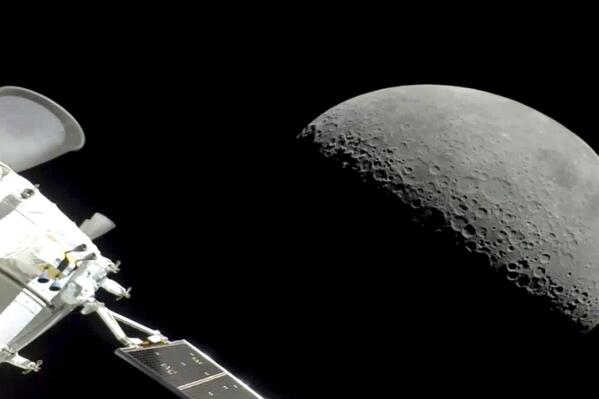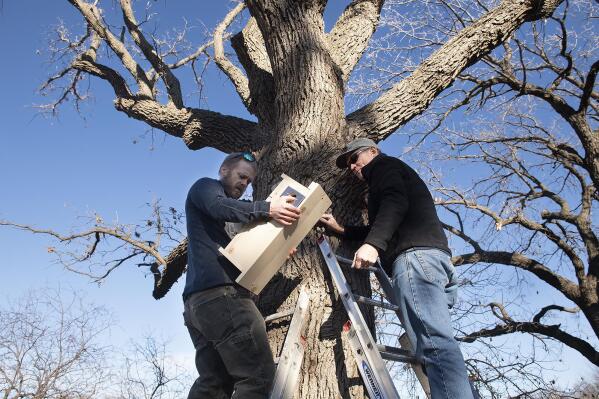Science
Can we feed the world without starving the planet? A new AP series spotlights innovators trying to solve this problem
More than 150 startups are chasing an ambitious goal: meat that doesn’t require raising and killing animals that is affordable and tastes and feels like the meat we eat now. (Nov. 16) (AP Video: Terry Chea)

More than 150 startups are chasing an ambitious goal: meat that doesn’t require raising and killing animals that is affordable and tastes and feels like the meat we eat now. (Nov. 16) (AP Video: Terry Chea)
More than 150 startups are chasing an ambitious goal: meat that doesn’t require raising and killing animals that is affordable and tastes and feels like the meat we eat now. (Nov. 16) (AP Video: Terry Chea)

Meat cultivated from cells — with no need to raise and slaughter an animal — is starting to show up in restaurants around the world. But can it be made cheaply enough to displace animal agriculture? (Nov. 16) (AP Video/ Emma H. Tobin)
Meat cultivated from cells — with no need to raise and slaughter an animal — is starting to show up in restaurants around the world. But can it be made cheaply enough to displace animal agriculture? (Nov. 16) (AP Video/ Emma H. Tobin)

Climate scientists have long said that eating more plants and fewer animals is among the simplest, cheapest and most readily available ways for people to reduce their impact on the environment. (Nov. 16) (AP Video: Daniel Niemann, Brittany Peterson)
Climate scientists have long said that eating more plants and fewer animals is among the simplest, cheapest and most readily available ways for people to reduce their impact on the environment. (Nov. 16) (AP Video: Daniel Niemann, Brittany Peterson)

For generations, beef has been a way of life in Texas. It’s also the single most damaging food for the planet. Some ranchers are turning toward regenerative ranching, to make burgers less burdensome. (Nov. 16) (AP Video/Shelby Lum)
For generations, beef has been a way of life in Texas. It’s also the single most damaging food for the planet. Some ranchers are turning toward regenerative ranching, to make burgers less burdensome. (Nov. 16) (AP Video/Shelby Lum)

In Senegal, pastoralists who now live with climate change in a way their parents never did say they see its effects in their daily lives — on water, on the animals, on the land. (Nov. 16) (AP Video/Yesica Fisch)
In Senegal, pastoralists who now live with climate change in a way their parents never did say they see its effects in their daily lives — on water, on the animals, on the land. (Nov. 16) (AP Video/Yesica Fisch)

Pastoralists in Mongolia draw on millennia of experience to raise livestock in harsh, volatile climates. What can they teach us as our environment changes? (Nov. 16) (AP Video/Shelby Lum)
Pastoralists in Mongolia draw on millennia of experience to raise livestock in harsh, volatile climates. What can they teach us as our environment changes? (Nov. 16) (AP Video/Shelby Lum)

No food is harder on the environment than beef. At Colorado State University, research centers on supplements used on feedlots, where most U.S. cattle spend their final months before slaughter. (AP Video/Shelby Lum)
No food is harder on the environment than beef. At Colorado State University, research centers on supplements used on feedlots, where most U.S. cattle spend their final months before slaughter. (AP Video/Shelby Lum)

In the Brazilian Amazon, home to 28 million people, saving the remaining rainforest will require ensuring that nearby communities are also able to sustainably make a living. (Nov. 16) (AP Video:Lucas Dumphreys)
In the Brazilian Amazon, home to 28 million people, saving the remaining rainforest will require ensuring that nearby communities are also able to sustainably make a living. (Nov. 16) (AP Video:Lucas Dumphreys)

Some Brazilian farmers are trying to scale up the practice of harvesting rainforest fruits. But there are many challenges due to poor road conditions and spotty internet and cell-phone service that makes it difficult to harvest the fruit before it spoils. (Nov. 16) (AP Video: Lucas Dumphreys)
Some Brazilian farmers are trying to scale up the practice of harvesting rainforest fruits. But there are many challenges due to poor road conditions and spotty internet and cell-phone service that makes it difficult to harvest the fruit before it spoils. (Nov. 16) (AP Video: Lucas Dumphreys)

The veggie burger has come a long way from the dry patties of the past, just not far enough to convert legions of meat lovers. But new techniques are in development, with hopes of satisfying our enduring craving for flesh with plants. (Nov. 16) (AP Video: Brittany Peterson)
The veggie burger has come a long way from the dry patties of the past, just not far enough to convert legions of meat lovers. But new techniques are in development, with hopes of satisfying our enduring craving for flesh with plants. (Nov. 16) (AP Video: Brittany Peterson)

Fish farmers in Indonesia are being trained as part of a larger plan by the Indonesian government to establish aquaculture villages around the country. (Nov. 16) (AP Video: Fadlan Syam, Kathy Young)
Fish farmers in Indonesia are being trained as part of a larger plan by the Indonesian government to establish aquaculture villages around the country. (Nov. 16) (AP Video: Fadlan Syam, Kathy Young)

At one company in France, protein-rich black soldier flies are being raised as a feed alternative for fish grown in farms. (Nov. 16) (AP Video: Angie Wang, Kathy Young)
At one company in France, protein-rich black soldier flies are being raised as a feed alternative for fish grown in farms. (Nov. 16) (AP Video: Angie Wang, Kathy Young)

Aquaculture has been the fastest growing food sector in the world for decades, and people now eat more farmed fish than wild fish. Fish farmers are trying new ways to boost production and minimize harm. (Nov. 16) (AP Video/Angie Wang, Kathy Young)
Aquaculture has been the fastest growing food sector in the world for decades, and people now eat more farmed fish than wild fish. Fish farmers are trying new ways to boost production and minimize harm. (Nov. 16) (AP Video/Angie Wang, Kathy Young)
The Protein Problem
How ‘lab-grown’ meat cultivated from animal cells could offer another sustainable food option
Science shows giving thanks has been part of human survival. Here’s how we got and stayed grateful
In case you missed it
Shimmering galaxies revealed in new photos by European space telescope
Scientists on Tuesday unveiled the first pictures taken by the European space telescope Euclid, a shimmering and stunning collection of galaxies too numerous to count. The photos were revealed by the European Space Agency, four months after the telescope launched from Cape Canaveral. (7 November 2023)


